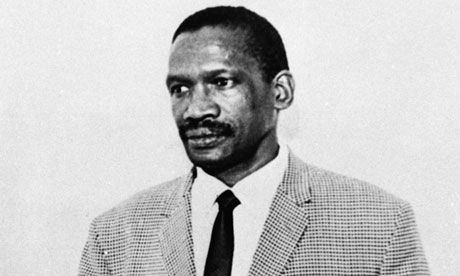G4S does the bidding of another illegal practice
From the Stop G4S campaign
Stop G4S is calling for a Europe-wide demonstration of outrage as G4S congratulate themselves on another year of profiteering at the expense of human dignity.
Bring banners, flags and drums; bring yourself and your friends. Refuse to be taken in by their whitewashing of abuses, join us at the AGM to hold G4S to account. The AGM will be held at Salters’ Hall, 4 Fore Street, London EC2Y 5DE, Thursday 6 June 2013, 1pm

South African political prisoners, such as Robert Sobukwe, above, were detained in single cells run by G4S for years; Photo by Bettmann/Corbis
G4S accused of holding South African prisoners in isolation illegally
Confidential government report lists 62 inmates held in single cells for up to three years, with some denied medication
By Ruth Hopkins in Johannesburg, Guardian
May 28, 2013
A South African prison run by the embattled British security firm G4S is illegally holding inmates in isolation for up to three years and denying them life-saving medication, according to a confidential South African government report. The report lists 62 inmates who were detained in single cells for periods ranging from two weeks to three years, against prison rules. Two of them were not given essential TB and HIV medication during their solitary confinement, it says. A recent visit to the prison in Bloemfontein by the Wits Justice Project suggested that the practice was ongoing.
Inmate Ouba Mabalane told the project that he had been held in solitary confinement in Mangaung prison from 23 November 2006 to 7 November 2009, without access to television, radio or rehabilitation programmes. He was only allowed out of his cell for one hour a day.
“The isolation drove me insane,” said Mabalane, adding that he had tried to kill himself in 2009. “I didn’t like being alone all day.” He said he had been held in a dark cell with sparse lighting and just a small window to let in some sunlight.
G4S is best known in the UK for bungling a contract to provide security at the London Olympics, forcing organisers to bring in the army at the last minute.
These days it is illegal to segregate prisoners as a punishment. The practice can be imposed under certain conditions, for example, if the prisoner is considered an escape risk or a threat to other inmates, or may be at risk of violence in a shared cell, but it must be reported to prison inspectors. For the practice to be legal, the inmate has to be visited by a nurse, psychologist or a medical practitioner every day.
According to the confidential report in 2009, the prison management ignored these stipulations. Mabalane said he was told he was being held in a single cell because his life was at risk from violent gangs, although his isolation was not reported as required. A recent visit to the Bloemfontein prison revealed that Ishmael Mohlomi was detained in a single cell from 22 November 2012 to 22 April this year, while Joseph Monaise was placed in isolation after being involved in a hostage situation at the prison in November.
“They told me they would detain me in that cell for two years,” he said.
He remains in isolation. In a letter to the inspectorate, the government controller at the prison, Clement Motsapi, said the three inmates had not been segregated but placed under “high care” – a form of detention which also requires reporting. In April inspectors from the Judicial Inspectorate for Correctional Services contacted the prison management to ask for further information on the isolation of inmates.
In correspondence seen by the Guardian, the management fails to explain the practice, although it is legally required to do so. Umesh Raga, of the Judicial Inspectorate, said: “It appears that the contractor (G4S) and the controller (a government official at the prison) need to sit around the table and address the question of responsibility and accountability to the inspectorate. On the one hand we are provided with information in respect of three inmates, the balance of the 62 is simply not addressed. We reiterate our request for comment/explanation on each of the inmates on the schedule.”
G4S told the Guardian that the controller at Mangaung prison had approved the detention of inmates in single cells. “Inspectors from the office of the judicial inspectorate visit the Mangaung correctional centre on a regular basis,” a statement said. “They have the opportunity to visit the different housing units and to communicate with inmates.
The Correctional Services Act specifies that inmates that pose a security risk must be detained and monitored in more stringent regimes. These inmates may be detained in a single cell as per their security classification. The controller at Mangaung correctional centre is employed by the department of correctional services to ensure that G4S Correction Services adheres to and operates according to approved policies and procedures. The detention of inmates in single cells at Mangaung correctional centre is approved by the controller.”
The company said it was not its policy to deny inmates access to TB or HIV medication, and that there were no “dark cells with sparse lighting” as claimed. “All cells at Mangaung correctional centre meet the standards prescribed by the department of correctional services. The accommodation is regularly inspected and approved by the department of correctional services and an independent engineer.”

